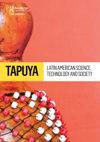农业食品领域的科学、技术和创新趋势
IF 1.2
Q2 HISTORY & PHILOSOPHY OF SCIENCE
Tapuya: Latin American Science, Technology and Society
Pub Date : 2022-11-18
DOI:10.1080/25729861.2022.2115829
引用次数: 2
摘要
本研究的目的是通过系统的文献综述来绘制农业食品部门新技术研究的最新状况,以探索世界趋势。系统综述的方法是从Scopus数据库中获取信息,按主题限制检索策略。使用了与主题相关的34个关键词,搜索仅限于科学文章的标题。对于数据和结果的编码和提取,使用VOSviewer软件生成、分组和可视化网络,并识别科学领域和趋势。近年来,农业食品部门的新技术发展有了显著增长,集中在少数国家、机构和学科。这些结果有助于识别科学范式的变化,并巩固不同的科学领域。可以看出,机器人、自动化、人工智能等领域正在获得人们的兴趣,而基因组学、生物技术和基因改良正在失去活力。此外,有关经济和社会分析及其与环境的关系的研究很少。本文章由计算机程序翻译,如有差异,请以英文原文为准。
Trends in science, technology, and innovation in the agri-food sector
ABSTRACT The aim of this research was to map the state of the art on studies of new technologies in the agri-food sector through a systematic literature review in order to explore world trends. The systematic review method consisted of obtaining information from the Scopus database, with the search strategy limited by subject. Thiry-four keywords related to the topic were used and the search was limited only to title of scientific articles. For the coding and extraction of data and results, the VOSviewer software was used to generate, group and visualize networks and identify scientific fields and trends. In recent years there has been significant growth in the development of new technologies in the agri-food sector, concentrated in a few countries, institutions and disciplines. The results allow to identify changes in scientific paradigms and consolidate different scientific fields. It is possible to perceive that the fields of robotics, automation, artificial intelligence, among others, are gaining interest, and that genomics, biotechnology, and genetic improvement are losing dynamism. In addition, there is little research related to economic and social analysis and their relationship to the environment.
求助全文
通过发布文献求助,成功后即可免费获取论文全文。
去求助
来源期刊

Tapuya: Latin American Science, Technology and Society
Social Sciences-Social Sciences (all)
CiteScore
1.60
自引率
0.00%
发文量
39
审稿时长
19 weeks
 求助内容:
求助内容: 应助结果提醒方式:
应助结果提醒方式:


